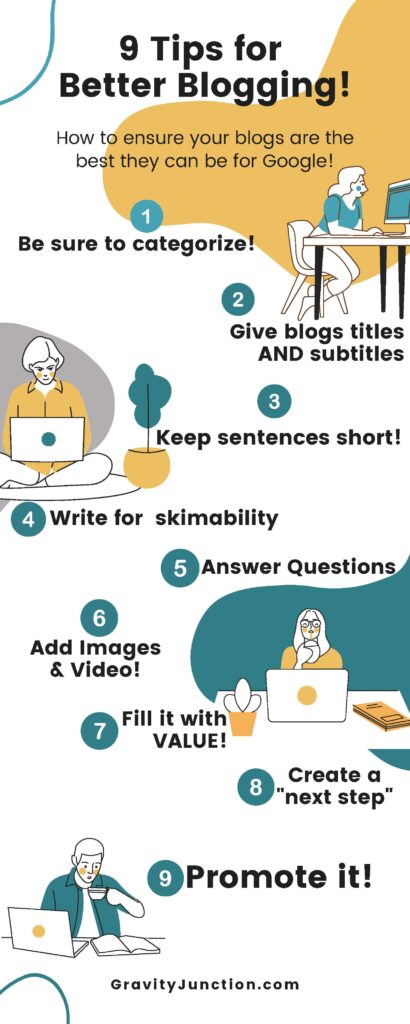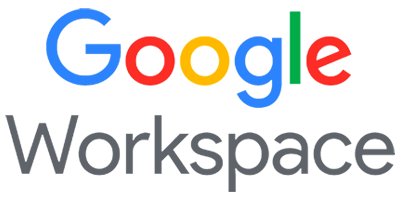What the hell is a blog anyway?
In 1997, what is commonly known today as a blog was first called a weblog. Initially, these were personal online journals. The term clearly had two letters too many and was mercifully shortened to “blog” around 1999. You remember 1999, right? Most of us were still grabbing free AOL discs from Walmart and hearing the proverbial “you’ve got mail” while we all accessed the internet on what we like to refer to as “the barbed wire” or dial-up.
Today, a blog can still be a personal journal, but it is more than just an article. Blogs serve as a signal to Google that you have added informational content to your site. Maybe that information is personal and details your obsession with Beanie Babies. More likely, if you blog, it’s to share knowledge with the world. Case in point, this article about blogs is a blog. When it’s published, Google will index it as a blog and determine, by its name and structure, that we added content to aid readers in learning about … blogs. Blogs can cover any subject matter; right now, this article is going to explain the relationship of blogs to content marketing and why you should give a flip.
Follow us here; you have your run-of-the-mill website, which includes a homepage, an about page, and a contact page. Maybe you even have a services page, and if you’re super fancy, you might have an FAQ page.
So why do you need any stinkin’ blogs?
Did you ever have a friend in high school who always had their nose in a book? Like, every few days, they would be reading a different massive novel while you struggled through one chapter of A Clockwork Orange. Google is that kid. Google is the biggest bookworm, nerd, smart kid, and informationaholic the world has ever seen. That’s what Google is… the biggest curator of information…EVER, the most voracious reader in recorded history. Well, Google’s spiders are anyway. We apologize if you didn’t know spiders were involved. They are cyber spiders, not literal ones, so there’s no need to light your computer on fire in the backyard.
Blogs are information. Google wants more information… badly. It wants it like a mom of two-year-old triplets wants to sleep.
So, blogs that are appropriately structured, containing key phrases, or answers to queries (aka questions) … well, Google loves those. LOVES THEM.
With that knowledge, content marketing became a buzzword and a revenue generator for marketers. Marketing has always revolved around content; it was just consumed differently. From newspaper ads to pamphlets, posters, and merchandise packaging, content has been there, and it’s still there in those same formats. We have just added the world-wide-web to the mix. Words and images have driven the sale of everything since the printing press was invented, and they still do.
Today, we are in an age of highly accessible information. If you need to sell something, a big part of that is providing as much value and education around that subject as you possibly can. One of the easiest ways to do that is through blogging.

So how do you blog? Is it as simple as writing an article?
It’s close, but there are a few technical nuances we have to take into consideration because we are writing for both humans and algorithms.
- Blogs need categories. Each article you write should be assigned a parent category. For example, if you’re a plumber and you’re reviewing Delta‘s newest bathroom faucets, an article could be in the bathroom fixtures category. One of the main reasons for this is the ability to display all of the articles about bathroom fixtures in a central location or, at the very least, you make it easy for your website visitor to find all of the articles about bathroom fixtures. As your library of articles about bathroom fixtures grows, Google gets the idea that you might be an authority on the matter.
- Blogs need titles and subtitles. The powers that be at Google figured out that people do not stay on word-laden pages unless those pages are broken up into bite-sized chunks of information. People skim more than they read, so adding a good title and then subtitles that make 900+ words easier to read is what we call SEO-friendly blogging.
- Blogs need shorter sentences. For the same reasons mentioned above, long and complex sentences tend to make the reader bounce. Attention spans for long-form content on the web are short. As Thomas Jefferson would advise, “never use two words when one will do.”
- Blogs need to be written for a middle school reading level, generally. This is not true if your website is intended for a niche audience with very specialized knowledge or if your product or service is for more highly educated people. Generally speaking, the average web-surfer is not an Ivy-League graduate with a degree in postmodern literature, so save the five-dollar words and your sesquipedalian tendencies for the office party. We aren’t saying that everyone reading your blog only made it to 8th grade grammar comp and threw in the towel. We are only saying that since most readers skim, and you don’t have their undivided attention, writing should be simpler and easy to understand without a lot of effort. You can install software on your website to help you determine what is reader-friendly and what is too high-brow.
- Blogs need images or video. Simply, blogs with relevant images that are named and appropriately indexed, or those with videos, tend to rank higher on Google.
- Blogs need either keywords or to answer a question. At Gravity Junction, we do a lot of keyword research. We also research competitors and look for gaps in their content to identify what they are missing. If you’re just getting started, write blogs around the questions you are most often asked.
- Blogs need the next step. In the middle of, at the end, and occasionally at the top, you’ll need to ask your reader to do something. This could be to enter the sales page to buy a product, sign up for a coupon, go follow your Instagram account, supply their email address, or simply leave a comment. Ask them to do something. If you don’t ask, they probably will not.
- Blogs need to be interesting, relevant, and full of value. The point of putting content on your website is to help your readers trust you and to educate them enough about your products and services that you pre-qualify them as customers before you ever know them.
- Blogs need promotion. You may very well gain organic traffic to your blog and that is the absolute goal. But if you can get people to read your blog sooner, why wouldn’t you? Use your social media channels to tell people that you have written something of value to help them. If you send out emails, tell the people you email to read your blog. And better than just telling them to read your blog, provide the link for them there so they can easily click to access the post you want to direct them to. People always appreciate when you make it easy for them to navigate your material.
Still not sure how to begin blogging? Download the free infographic that tells you how to set up your blog and gives you multiple resources to help you start adding content to your website.
Writing not your thing? Reach out today to have Gravity Junction’s award-winning, talented writers start crafting your blogs.









0 Comments